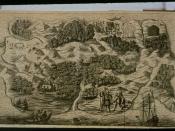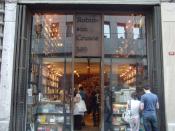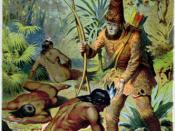"Robinson Crusoe" is more than just a story about a man shipwrecked on an island. The island is paradoxical place, because it simultaneously becomes a heaven and a threat. It will overwhelm and conquer Crusoe if he does not make it his paradise. The psychological tricks are survival tactics. And as many philosophers wrote that man in this sort of state of nature was a social animal, that the bestial life of the solitary savage was insecure, and that so far from being happy, the isolated natural man lived in constant fear of death. This is very true in the case of Robinson Crusoe, the entire time he is on the island his decisions are driven by his fears and in some cases his lust for power. It also depicts a man's journey of Christianity and how his faith gives him a sense of power which he pushes upon others
At the beginning, Robinson Crusoe constantly hesitate as to whether or not he had made the right decision in running away from his home, which is due to the fact that his personality is simply changing and uncertain.
Robinson's impressionable youth is shown in this inability to stay rooted to one emotion or decision. Clearly he does not know who he is, or who he is supposed to be. We cannot ever be sure that he has faith in himself. This lack of confidence paints a very timid picture of the narrator. It is a picture describing who Robinson used to be. After his wreck on the island, another contradictory sense emerged in Robinson's behaviour, civilization meets the wild. Essentially he oscillates between the roles of civilized, middle-class businessman and a primitive nature lover. Defoe means for us to view the island as a completely distinct world,


